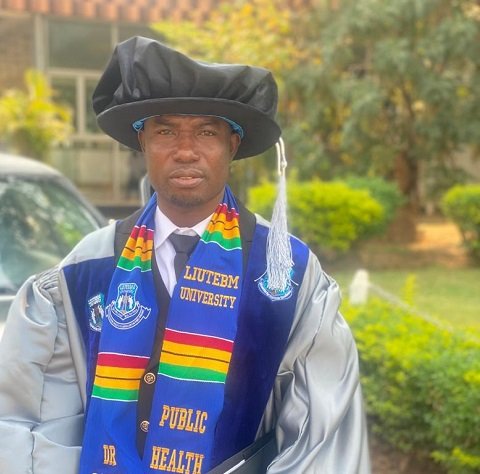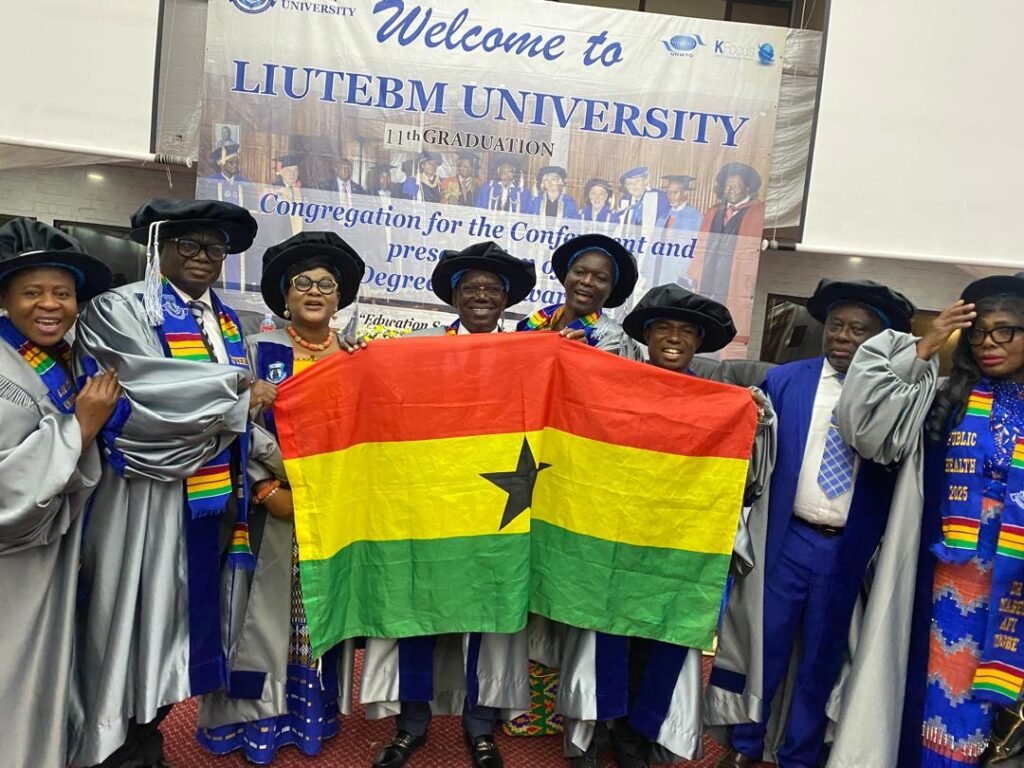News
Capacity building is essential to healthcare regulations in Ghana- Dr Daniel Asamoah

A Health Inspector and a Public Health specialist at Health Facilities Regulatory Agency (HeFRA) says it is prudent for healthcare regulators to build their capacity to have the needed skills and knowledge to ensure health facilities acquire the required materials, tools and equipment to carry out their duty of offering the utmost care for the public.
According to him, such capacity building will upgrade their academic qualifications, right training in the skills and knowledge needed.
He made these revelations when speaking to Ghanaian Times after earning a Doctor of Philosophy (PhD) in Public Health from the Livingstone International University of Tourism Excellence and Business Management(LIUTEBM) in Lusaka, Zambia.
His dissertation was titled, “Healthcare Facilities Regulations in Ghana: Compliance and Challenges.”
“I have vast expertise and innovative approach to addressing key issues in Ghana’s health sector and my research is expected to contribute significantly to regulate healthcare and regulations including public health policy in Ghana and beyond,” he told the Ghanaian Times .
Work at HeFRA
Despite being a gospel artiste known in the Showbiz circles as ‘The Singing Prophet’ , Dr Asamoah has built a reputation as a respected professional in health regulations, healthcare facility establishment in the country and developed standard operating procedures for monitoring unit in HeFRA and other healthcare facilities.
“At HeFRA ,I created a database for all health facilities for the agency, reviewed all old files under the private hospitals and maternity home board and migrated them onto HeFRA while also developing the first version of the inspection and monitoring visit forms for the agency,” he said.
Way Forward
Dr Asamoah noted that he remains a strong force in health regulations and will continue to contribute and seek the best healthcare facilities for the country and beyond.
Other awardees
Eleven other Ghanaians also received their PhDs at the event .
They are Dr Jennifer Andoh, Dr Mabel Afi Togbe, Dr Catherine Armah, Dr Gifty Dede Mateko Angmor , St Augustina Ampah and Dr Hafez Adam Taher ,PhD in Public Health.
In Accounting and Finance, Dr Felix Ahima-Adonteng bagged the enviable title, while Dr Raphael John Marfo was awarded PhD. in Management.
Dr Isaac Setordzi and Joseph Okine also received their PhDs in International Business and Project Management, respectively.
By Edem Mensah-Tsotorme
News
Raissa Initiative demands harsher punishment for sexual abusers of girls

The Founder of the Raissa Child Protection Initiative, Ms Raissa Sambou, has urged authorities to impose severe punishment on individuals, including teachers and guardians, who sexually abuse young girls.
Speaking in an interview to mark this year’s International Day of the Girl Child (October 11), Ms Sambou condemned the increasing cases of sexual exploitation involving minors, describing such acts as “heartless, criminal, and a total betrayal of trust.”
She noted that those entrusted with the care and education of children must not be the same people who violate them, stressing that “anyone found guilty of abusing a girl child must face the full rigours of the law without leniency.”
The International Day of the Girl Child is observed annually to promote the rights of girls, empower them to reach their full potential, and draw attention to the challenges they face worldwide.
Ms Sambou lamented that poverty continues to push many young girls into vulnerable situations, exposing them to exploitation.
She expressed concern that some headmasters, teachers, and community members who should protect girls rather take advantage of them.
“This must stop immediately. The safety of every girl must never be compromised,” she said, urging the public to report all forms of abuse to the appropriate authorities and called for swift action by law enforcement agencies against perpetrators.
Addressing girls directly, Ms Sambou encouraged them to take their education seriously and to believe in their potential.
“It is possible to be young and responsible. Your future is bright, protect it, believe in it, and never let anyone dim your light,” she advised.
She further urged girls to choose their friends wisely, stay disciplined, and speak up if anyone makes sexual advances toward them.
Ms Sambou concluded with a rallying call for collective action, saying “speak up, protect them, and empower them. Together, we can end the sexual exploitation of girls.”
By Esinam Jemima Kuatsinu
Join our WhatsApp Channel now!
https://whatsapp.com/channel/0029VbBElzjInlqHhl1aTU27
News
CSIR-CRI introduces new tomatoes
In the soil of Kumasi and Berekum, two new tomato varieties are changing the way farmers think about food, science, and the future. They are called KOPIA Tomato and CRI-Kwabena Kwabena.
Developed by the Council for Scientific and Industrial Research–Crops Research Institute (CSIR-CRI), these are Ghana’s first-ever open-pollinated tomato varieties. That means farmers can save seeds, replant, and reap the benefits without relying on expensive imports or hybrid restrictions.
“This is a game-changer,” said Dr Michael Kwabena Osei, lead research scientist on the project. “These tomatoes mature early—just 55 days—and they are built to thrive. High yields, strong disease resistance, and high Brix levels make them perfect for fresh markets and industrial processing alike,” he added.
Backed by Korea’s Rural Development Administration (RDA) and funded through the Korea Partnership for Innovation of Agriculture (KOPIA), the project also enjoys support from Ghana Care Obaatanpa under the Ministries of Agriculture and Finance.
Recently, the newly appointed KOPIA Ghana Director, Dr Young Jin Kim, visited tomato project sites in Kumasi and Berekum. Accompanied by KOPIA Administrator, Mr Noah Lanyon, Farm Manager, Mr Abdullah, and visiting scientist, Hyunju Jeong, the team toured breeder and foundation seed fields—where the future of Ghana’s tomato industry is being quietly cultivated.
Local farmers spoke with pride about the new varieties. They praised their resilience, sweetness, and market appeal. But they also voiced a clear plea that “timely access to seeds is critical if this breakthrough is to reach its full potential. These tomatoes are ready. We just need the seeds to reach us in time,” they indicated.
The varieties are already thriving in Ghana’s forest and transitional agro-ecological zones—covering Ashanti, Bono, Bono East, and Ahafo regions. Adaptive trials are underway to expand their reach nationwide.
FROM KINGSLEY E. HOPE, KUMASI
Join our WhatsApp Channel now!
https://whatsapp.com/channel/0029VbBElzjInlqHhl1aTU27








